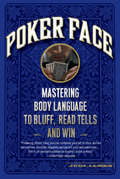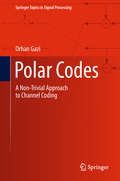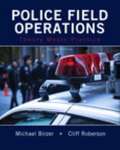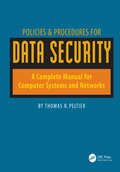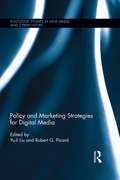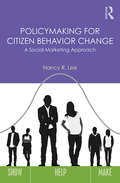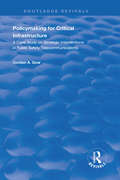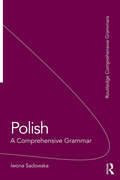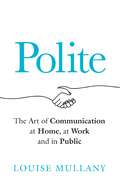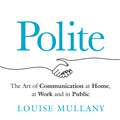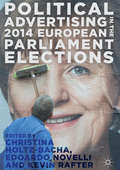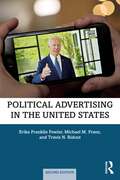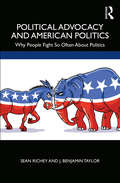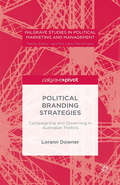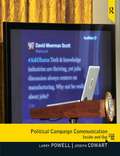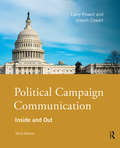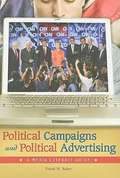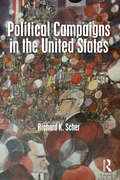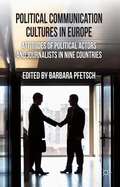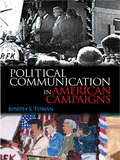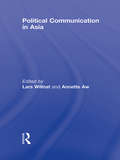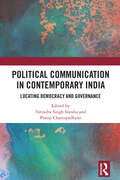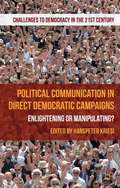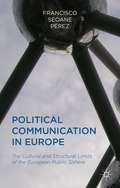- Table View
- List View
Poker Face
by Judi JamesThe outcome of card games rests heavily on luck, but poker is predominantly a game of skill - and a major part of that skill is the ability to read an opponent's body language while maintaining control over your own unspoken signals. Explains each stage of lying and bluffing: James - a top body-language guru and image consultant - lays down, step by step, how to disguise your hand and unmask bluffers. By identifying body language giveaways - from posture, facial expressions, to how players hold their cards and chips - and what they reveal, we learn how to hide our emotions and give off misleading cues. Identifies four main poker "personalities": Most players display the traits of one of four different personality groups that influence how they play poker. Their verbal interactions and body language give them away. For each personality, Poker Face reveals the key physical tells that expose bluffing and winning or losing hands.
Polar Codes: A Non-Trivial Approach to Channel Coding (Springer Topics in Signal Processing #15)
by Orhan GaziThis book explains the philosophy of the polar encoding and decoding technique. Polar codes are one of the most recently discovered capacity-achieving channel codes. What sets them apart from other channel codes is the fact that polar codes are designed mathematically and their performance is mathematically proven. The book develops related fundamental concepts from information theory, such as entropy, mutual information, and channel capacity. It then explains the successive cancellation decoding logic and provides the necessary formulas, moving on to demonstrate the successive cancellation decoding operation with a tree structure. It also demonstrates the calculation of split channel capacities when polar codes are employed for binary erasure channels, and explains the mathematical formulation of successive cancellation decoding for polar codes. In closing, the book presents and proves the channel polarization theorem, before mathematically analyzing the performance of polar codes.
Police Field Operations: Theory Meets Practice
by Cliff Roberson Michael L. BirzerPolice Field Operations: Theory Meets Practice, 2/e is a comprehensive, readable text that presents a practical look at police field operations and is designed to be used in one-semester courses on police operations or patrol procedures. Chapters have been designed to be independent units that can be taught individually, but also build upon each other to provide a complete picture of police operations. The text cover all major areas of police operations including patrolling, investigations, crime mapping, community policing, hot pursuit issues, communications, gangs and drugs, and more. Discussions focus on issues and challenges that police officers face on the job and help students bridge the gap between theory and practice.
Policies & Procedures for Data Security: A Complete Manual for Computer Systems and Networks
by Thomas PeltierHere‘s your how-to manual for developing policies and procedures that maintain the security of information systems and networks in the workplace. It provides numerous checklists and examples of existing programs that you can use as guidelines for creating your own documents.You‘ll learn how to identify your company‘s overall
Policy and Marketing Strategies for Digital Media (Routledge Studies in New Media and Cyberculture)
by Robert G. Picard Yu-Li LiuWith digital media becoming ever more prevalent, it is essential to study policy and marketing strategies tailored to this new development. In this volume, contributors examine government policy for a range of media, including digital television, IPTV, mobile TV, and OTT TV. They also address marketing strategies that can harness the unique nature of digital media’s innovation, production design, and accessibility. They draw on case studies in Asia, North America, and Europe to offer best practices for both policy and marketing strategies.
Policymaking for Citizen Behavior Change: A Social Marketing Approach
by Nancy R. LeeSocial marketing is a discipline unfamiliar to many policymakers, often confused with the more frequently applied and studied fields of social media, behavioral economics, or social change. Social marketing is a growing field and methodology, however, that has been successfully applied to improve public health, prevent injuries, protect the environment, engage communities, and improve financial well-being. Policymaking for Citizen Behavior Change is designed to demonstrate the ways in which social marketing can be an effective and efficient tool to change citizens’ behavior, and how to advocate for and support its appropriate application. Providing a 10-Step Planning Model and examining a variety of social marketing cases and tools, including more than 40 success stories, Policymaking for Citizen Behavior Change is core reading for current policymakers, as well as all those studying and practicing social marketing, particularly in the public sector. It’s also worthwhile supplementary reading for those studying public policy, public administration, environmental justice, public health, and other programs on how to effect social change.
Policymaking for Critical Infrastructure: A Case Study on Strategic Interventions in Public Safety Telecommunications (Routledge Revivals)
by Gordon A. GowOriginally published in 2005. By weaving together three distinct fields - public policy, technology studies and management of critical infrastructure - this volume shows how public policy can help to improve the management of large technical systems. A much-needed analytical framework, based on approaches drawn from established work in science and technology studies, is applied to a case study of the development of a new public safety service for mobile telephones. This example of emerging growth and change in critical infrastructure allows Gordon Gow to identify current problem areas and to refine a more general set of strategies aimed at improving public policy processes in the management of technology. The work also discusses a range of contemporary issues in telecom policy and regulation, such as public consultation, technical standards, network unbundling and interconnection. This insightful work provides observations and recommendations for policy makers, regulators, industry and consumer groups alike, furthering the improved coordination of efforts across these domains of interest.
Polish: A Comprehensive Grammar (Routledge Comprehensive Grammars)
by Iwona SadowskaPolish: A Comprehensive Grammar is a complete reference guide to the grammar system for intermediate to advanced learners of Polish. It presents an accessible and systematic description of the language, focusing on real patterns of use in contemporary Polish. The Grammar is a comprehensive work and an invaluable resource for students and anyone interested in linguistics and the way modern Polish works. Features include: coverage of all parts of speech full cross referencing well selected and illuminating examples. The book is organised in such a way to promote a thorough understanding of Polish at all levels of structure; the sound system, formation of word and phrases and sentence construction. It offers a stimulating analysis of the complexities of the language, providing clear explanations and examples of each point. Polish: A Comprehensive Grammar is the essential reference work on Polish grammar for all learners and users of the language.
Polite: The Art of Communication at Home, at Work and in Public
by Louise MullanyThe first ever mass-market book on politeness and the important role it plays in our work, relationships and lives, from professor and pioneer of Politeness Theory, Louise MullanyAre women really more polite than men?What is the best way to apologise?And when is it OK to swear?Politeness rules our day-to-day lives, whether it's speaking to colleagues about issues at work, dealing with difficult family members or wondering if you should eat the last piece of pie. For years, Professor Louise Mullany has been examining the prevalence and power of politeness in our everyday speech and actions, and discovering what this says about us.In Polite, Louise shows how the unseen science of politeness governs everything we do, from what we say to how we act, and reveals how a better understanding of the rules and norms of politeness can help us in all aspects of our work, leisure and home lives.And, in doing so, she answers the age-old question... are politeness standards really declining?
Polite: The Art of Communication at Home, at Work and in Public
by Louise MullanyThe first ever mass-market book on politeness and the important role it plays in our work, relationships and lives, from professor and pioneer of Politeness Theory, Louise Mullany'Fascinating and insightful. I'm grateful to have read it, and pleased to have learnt so much in the process. I would - politely - encourage you to do the same.' Jon McGregorAre women really more polite than men?What is the best way to apologise?And when is it OK to swear?Politeness rules our day-to-day lives, whether it's speaking to colleagues about issues at work, dealing with difficult family members or wondering if you should eat the last piece of pie. For years, Professor Louise Mullany has been examining the prevalence and power of politeness in our everyday speech and actions, and discovering what this says about us.In Polite, Louise shows how the unseen science of politeness governs everything we do, from what we say to how we act, and reveals how a better understanding of the rules and norms of politeness can help us in all aspects of our work, leisure and home lives.And, in doing so, she answers the age-old question... are politeness standards really declining?'A must-read for anyone interested in becoming a more effective communicator.' Michael Haugh, The University of Queensland
Political Advertising in the 2014 European Parliament Elections
by Christina Holtz-Bacha Kevin Rafter Edoardo NovelliThis timely publication offers a fresh scholarly assessment of political advertising across the EU, as well as an insight into differing political and regulatory systems related to political advertising in the individual member states. With a detailed focus on the images and communication styles that characterised the 2014 European Parliament election campaign, this edited collection evaluates political advertising across the EU using empirical data to compare and contrast styles and approaches in different members. This work allows the authors to offer an important evaluation of the similarities and differences in the posters and broadcasts used to win public support in the 2014 campaign at the time of the great European recession and financial crisis, specifically looking at the place of posters and video commercials. This book will appeal to researchers and students of political communication, political science, history, European studies as well as candidates and campaign workers who want a more comprehensive understanding of the representation of Europe in political adverts at the 2014 elections.
Political Advertising in the United States
by Michael M. Franz Travis N. Ridout Erika Franklin FowlerPolitical Advertising in the United States examines the volume, distribution, content, and effects of political advertising in congressional and presidential elections. The book considers the role of television ads using extensive data on ad airings on local broadcast stations. It also analyzes newly available data on paid digital ads, including ads on Facebook, Instagram, Google, and YouTube. The book covers the role of outside groups in airing ads, including the rise of dark money groups and gaps in existing federal campaign finance laws around transparency of outside group spending. The authors consider how ad sponsors design and target ads. They also review the positive and negative implications of an electoral system where billions are spent on paid advertising. With detailed analysis of presidential and congressional campaign ads and discussion questions in each chapter, this accessibly written book is a must-read for students, scholars, and practitioners who want to understand the ins and outs of political advertising. New to the Second Edition • Covers the spending, content, and tone of political advertising in the 2016 and 2020 presidential elections and the 2018 midterms, looking ahead to 2022 and 2024. • Addresses the interference of foreign actors in elections and their connection to political advertising. • Expands the discussion of digital political advertising and incorporates this topic into every chapter. • Adds a new chapter specifically addressing digital ad content and spending. • Includes data from the Facebook, Google, and Snapchat ad libraries and explores the role of these companies in regulating the sale of political advertising. • Incorporates new data on the effects of race and gender in advertising, including what is known about the way in which advertising may activate prejudicial attitudes.
Political Advocacy and American Politics: Why People Fight So Often About Politics
by J. Benjamin Taylor Sean RicheyPolitical Advocacy and American Politics provides a detailed explanation as to why citizens engage in interpersonal advocacy in the United States. Sean Richey and J. Benjamin Taylor eloquently show how the campaigns, social media, and personality and partisanship affect one's propensity for candidates, which often leads to arguments about politics. Using original qualitative, survey, and experimental studies, Richey and Taylor demonstrate the causes of political advocacy over time in the political environment and at the individual level. While some worry about the incivility in American politics, Richey and Taylor argue political talk, where conflict is common, is caused by high-activity democratic processes and normatively beneficial individual attributes. Furthermore, Richey and Taylor argue that advocacy—when conceptualized as a democratic "release valve"—is exactly the kind of conflict we might expect in a vibrant democracy. Political Advocacy and American Politics: Why People Fight So Often About Politics is ideal for university students and researchers, yet it is also accessible to any reader looking to learn more about the role campaigns and personal attributes play in the decision to advocate.
Political Branding Strategies: Campaigning and Governing in Australian Politics (Palgrave Studies in Political Marketing and Management)
by Lorann DownerPolitical Branding Strategies tells the story of branding by the Australian Labor Party across seven years and three brands – Kevin07, The Real Julia and that of the party. Employing a new framework to understand and evaluate branding, the book offers lessons for practitioners, researchers and citizens in democracies everywhere.
Political Campaign Communication: Inside and Out
by Larry Powell Joseph CowartPolitical Campaign Communication: Inside and Out examines the ins and outs of political campaigning through the eyes of both an academic and a political consultant. This text takes a unique approach to the subject of campaign communication by examining its intricacies from views both inside and outside of the process. Unlike many texts in this field, Political Campaign Communication: Inside and Out takes a broad view of political campaigning, discussing theories and principles, along with topics such as political socialization, the role of money, ethics, and critical events.
Political Campaign Communication: Inside and Out (Lexington Studies In Political Communication Ser.)
by Larry Powell Joseph CowartNow in its third edition, Political Campaign Communication: Inside and Out examines the intricacies of political campaigning through the eyes of both an academic and a political consultant. Unlike others in its field, this text takes a broad view of political campaigning, discussing both theories and principles, along with topics such as political socialization, the role of money, ethics, and critical events. This new edition delves into ongoing changes in the American political environment, with fuller examinations of women and gender, the involvement of social media in political campaigning, political money, and ethics. Advanced undergraduate and graduate students of political communication can make use of updated chapter-by-chapter discussion questions and online practice quizzes.
Political Campaigns and Political Advertising: A Media Literacy Guide
by Frank W. BakerBaker, a media literacy consultant and author, has written this media literacy guide for general readers who want more critical insight into propaganda and spin, political advertising and the role of new media technologies in election campaigns. The author uses clear and easy-to-understand language to examine and interpret the content of media messages in print, image and multimedia forms in an objective manner. The author supplies both a timeline of the history of media in politics from 1913 to the present and a glossary of political and media terms. Annotation ©2009 Book News, Inc., Portland, OR (booknews.com)
Political Campaigns in the United States
by Richard K. ScherA Choice Highly Recommended Title—January 2017 This book is an interpretive analysis of political campaigns in America: instead of focusing on how campaigns are designed and run, it investigates the role campaigns play in our American politics, and the close symbiosis between campaigns and those politics. The text examines how campaigns are an important manifestation of how we "do" politics in this country. Hallmarks of this text include: showing how campaigns can undermine our democracy and asking how democratic they—and by extension, our politics--really are; demonstrating that the ability of the media to accurately, fairly, and deeply report on campaigns has been severely compromised, both because of the growing "distance" between campaigns and media outlets and because of the structure of "Big Media" corporate ownership and its tight relationship to "Big Money." It asks important questions about the media including: How do the media, reporters in particular, cover campaigns? What pressures and forces shape what and how they present campaigns? What is the impact of the ever-increasing chasm separating campaigns and the media? How does the close tie between corporate mainstream media and Super PAC money affect campaign coverage? How does the ability of campaigns and media to segment voters into ever-smaller slices influence how campaigns are covered? tracking the continuing growth of unregulated, private, unaccountable "dark money" in campaigns as a threat to our democratic elections and politics. Democracy rests fundamentally on transparency and accountability – sunlight – and our campaign laws and norms now allow and encourage exactly the opposite, largely because of decisions by the United States Supreme Court.
Political Communication Cultures in Europe
by Barbara PfetschThis book offers new and compelling insight into the orientations that shape the cultures of political communication in nine Western democracies. It is a truly comparative account of the views of 2500 political elites and media elites between Helsinki and Madrid on their relationship and their exchanges.
Political Communication in American Campaigns
by Joseph S. TumanIn Political Communication in American Campaigns, Joseph S. Tuman provides a comprehensive, clear, and accessible treatment of American campaign rhetoric and argues that modern elections are not really about contests between candidates or political parties; rather, they are more about the competing messages each player in the political process must present to persuade and reach voters.. This book′s triangulated approach to political communication includes (1) all forms of campaign speech and oratory; (2) the rhetorical dimensions of campaign debates; and (3) candidate/campaign interaction with mass media. Key Features Allows readers to deconstruct and understand how and why speeches affect voters: Offers methods for understanding how political speeches are constructed and targeted, as well as how to apply these methodologies to a variety of campaign oratories. Provides a comprehensive and entertaining explanation of the history of campaign debates in the United States: A historical description of the evolution of political campaign helps situate modern debates within the context of specific mass media strategies and tactics employed by campaigns. Reflects how changes in mass media have now influenced how campaigns communicate messages to voters: Explores the relationship between campaigns and mass media, with an emphasis on paid and free media, and addresses the contemporary intersection of campaign Web sites and blogs with campaign main messages, fundraising, manipulating news coverage and creating ads. Offers an insider′s view of how campaigns work—and how news media coverage of campaigns works: The book is written with additional insights from the author′s experiences as a political consultant and as a political analyst for news media. Presents contemporary examples that all readers will understand: Real-life case studies of debates from both state and national elections; all forms of campaign oratories; and mass mediated campaigns. Intended Audience This text is designed for advanced courses dealing with such topics as political communication, media & politics, presidential rhetoric, and persuasion, as found in departments of communication, media studies, and political science.
Political Communication in Asia (Routledge Communication Series #23)
by Lars Willnat Annette AwThis edited volume provides a critical review of political communication research conducted in Asia over the past twenty years. Each chapter focuses on studies published in a specific Asian country, selected according to the level of contribution made to the field of political communication in Asia. Covering China, Hong Kong, Taiwan, South Korea, Japan, Singapore, Malaysia, Indonesia, and India, the book’s primary objective is to review the unique theoretical accomplishments made by Asian communication scholars, thus contributing to a better awareness and understanding of political communication research in Asia. The contributors are well-respected Asian media scholars writing on political communication in their countries of origin. Each author reviews studies conducted and published in his/her native country and language(s). This book provides a first review of these studies, most of which have never been published in English, and makes them available to international scholars. The contributors discuss each country’s political background, and address the findings and conclusions of the political communication studies conducted in their respective countries during the past two decades. The chapters focus on insights that have been made by adapting Western media theories to the unique social, cultural, or political contexts that exist in each country. The authors also point out possible gaps in the current research within their respective countries and to make recommendations for future studies.
Political Communication in Contemporary India: Locating Democracy and Governance
by Yatindra Singh Sisodia Pratip ChattopadhyayThis book explores the forms, patterns, and trends in political communication in India in the twenty-first century. It underlies the influence of context in political messaging laying bare its complex, overlapping, and multidimensional structures. The volume: Examines how political decision-making is shaped by media — through political speeches, community opinion leaders, and formal and informal public conversations. Explores a range of political communication channels— from community radio to social media. Presents an overview of the problems associated with message designing and message dissemination through communication channels in a political setting. Highlights how political communication impacts critical aspects of democracy and governance and goes beyond mere rhetoric. A comprehensive work on the production, diffusion, transmission, and impact of information in a political environment, this book will be of great interest to scholars and researchers of politics, governance, democracy, media and communication studies, journalism, cultural studies, and South Asian studies.
Political Communication in Direct Democratic Campaigns
by Hanspeter KriesiAnalyzes the communication processes in direct democratic campaigns and their effect on the opinion formation of the voters. Based on a detailed analysis of the politicians' strategies, media coverage and the opinion formation of the public in three campaigns, this book argues that the campaigns are more enlightening than manipulating.
Political Communication in Europe: The Cultural and Structural Limits of the European Public Sphere
by Francisco Seoane PérezThe disconnection between the institutions of the EU and the people of Europe has often been attributed to the existence of a communication gap resulting from the failure of national medias and politicians to convey the importance of the EU. This book challenges that idea instead showing that the fault lies with the idea and institutions of the EU.
Political Communication in Postmodern Democracy
by Katrin Voltmer Kees BrantsThis book explores the changing relationship between politics, the media and citizens. Based on comparative evidence from the UK and the Netherlands it provides new insights into the dynamics of political communication in post-modern democracy, which is characterized by uncertainty about the location of politics and an erosion of grand narratives and political ideologies. The contributions of this volume aim to understand these changes as a two-dimensional process: the horizontal dimension encompasses the shifting power balance between politicians and the media. The vertical dimension explores how new forms of citizenship and the pervasiveness of popular culture alongside new communication technologies are challenging the authority of both established journalism and institutionalized politics. What emerges is a complex picture of politicization and de-politicization, elite dominance and the power of vox populi, mediatisation and effective control of political elites over the public agenda.
